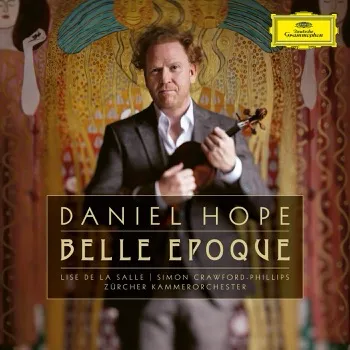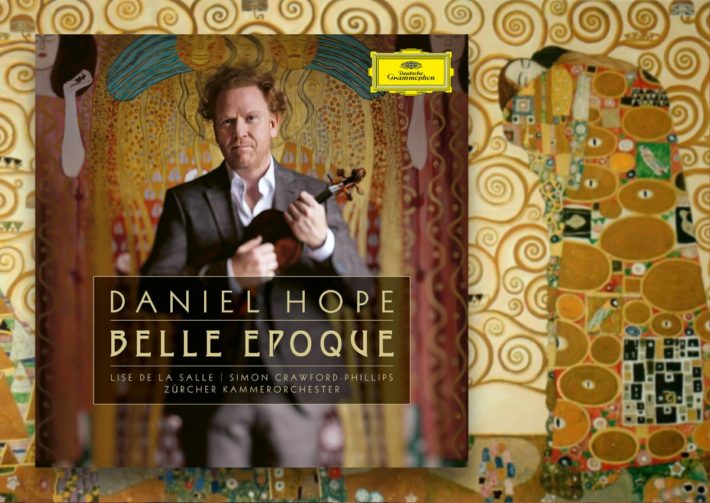If there was a soundtrack to the age the paintings of Klimt, Monet, Renoir and Munch, this new album from Daniel Hope – titled “Belle Époque” after the era in which the music was written – would be it. With a playtime of 2.5 hours, this carefully curated musical embarks on a tour of Europe, taking musical snapshots of major cultural centers of the time — London, Paris and Vienna. Most of the album is a potpourri of encores and fillers, but it also contains four evenly spaced complete works.

Opening is an arrangement for strings and solo violin of Debussy’s “Rêverie”, in which Hope captures the spirit of a daydream effectively. The string colors and textures contrast with Hope’s melodious tone. Similarly in the other Debussy arrangement, “La Fille aux Cheveux de Lin” (CD 1, track 6), this time with pianist Simon Crawford-Phillips, Hope captures a beguiling air. Pianists might miss the recordings of Jean-Efflam Bavouzet or Jean-Yves Thibaudet, but Hope’s versions find something quite different to say. Hope’s violin tone is yielding and his pianissimos are admirable for their resonance and delicacy.
The most substantial work here is Ernest Chausson’s Concerto Op. 21, for the unusual combination of piano, violin and string quartet. Not a Concerto in the traditional sense, this four-movement work uses the string quartet as accompanists to the two soloists. In Hope’s version, the quartet is expanded to include the strings of Zürich Kammerorchester, whose symphonic sound brings a very different palette of colors to this chamber work.
Hope and pianist Lise de la Salle keep an emotional distance, bringing beauty and sophistication in a pleasing if sometimes cool performance, but one which fits stylistically with the rest of the album. Pascal Rogé, Pierre Amoyal and Quatuor Ysaÿe bring greater drama with this work while Isabelle Faust and Alexander Melnikov perform with the Salagon Quartet, who’s period instruments bring a historical perspective.
Charles Koechlin’s “Quatre Petites Pièces” for piano, violin and French horn are reordered into a different but musically convincing sequence from the published order. Joining Crawford-Phillips and Hope is horn player Stephan Dohr, who’s playing is slightly understated, allowing Hope to come to the fore. On all four movements, there is a delicate interplay between the players, and in the last of the sequence (“Andante”), the players convey emotional darkness.
Anton Webern, Alban Berg and their teacher Arnold Schoenberg may not be names associated with “La Belle Époque”, but Schoenberg’s early music is very romantic, as exemplified by his “Piece in D Minor”. This melodious miniature, stylistically speaking, is very much a piece of salon music, and is played lyrically by Hope and Crawford-Phillips.
The same approach is taken in Berg’s “Winter” from “Jungenlieder”. Webern’s Four Pieces for Violin and Piano Op. 7 characterize Webern’s concise musical idiom. They provide some welcome contrast on this extensive album. Their atonal language may not appeal to everyone’s taste, but they are eloquently played by Hope and Crawford-Phillips, who can realize this expressive music with conviction.
The final complete work on the album is Elgar’s substantial “Introduction and Allegro” for strings. Hope takes the lead here with the Zürich Kammerorchester, and clearly has a natural affinity to this composer, as he shows in another piece by the British composer in this album, an arrangement to “Chanson de Matin” (Arr. Bateman).
Another piece worth highlighting is Reynaldo Hahn’s “Á Chloris” (CD 1, track 4). While the beauty of de Viau’s words are missing, Hope phrases the melody beautifully in this convincing arrangement. In Strauss’ “Morgen”, Hope is joined by soprano Mojca Erdmann. while her tone is not as robust as Elisabeth Schwarzkopf or Lise Davidsen, her lyrical voice works well with Hope’s characterful sound.
The performances were caught reliably and consistently in the Teldex Studios, Berlin. A very mellifluous and enjoyable album by DG, which can be enjoyed easily in a single sitting, whether taking it as discerning listen or as background music.
Top image: ©️ Wouter Maeckelberghe
“Belle Epoque“
Daniel Hope – violin
Mojca Erdmann – Soprano
Simon Crawford-Phillips – Piano
Stefan Dohr – Viola
Jane Berthe, Harp
Maria Todtenhaupt – Harp
Lise de la Salle – Piano
Yibai Chen – Cello
Zürcher Kammerorchester
Deutsche Grammophon, CD 4837244




















